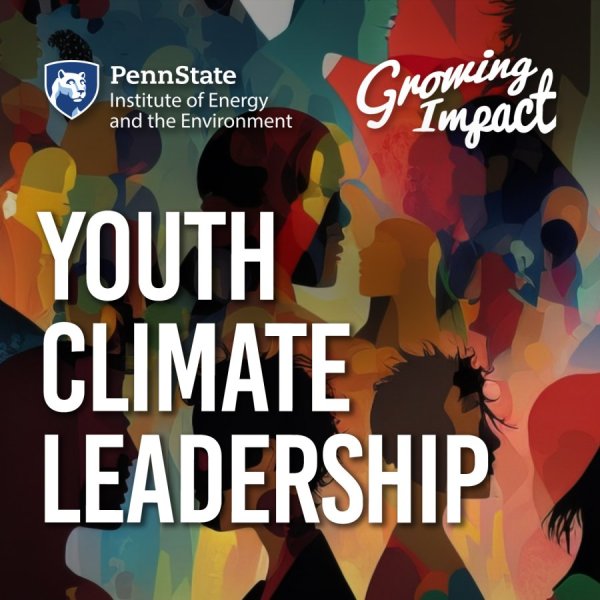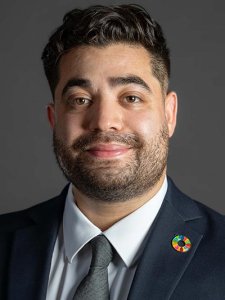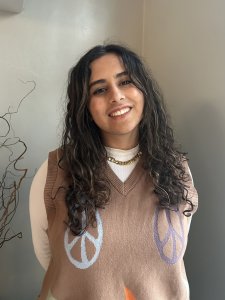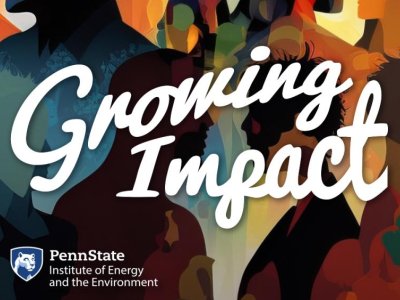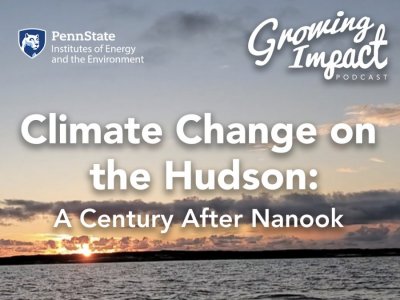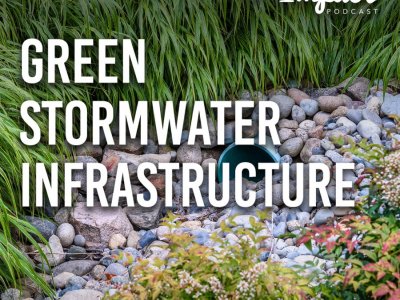26-minute listen/watch | 19-minute read | 1-minute teaser
The global push to involve youth in climate action is gaining momentum, harnessing their innovative spirit, deep investment in the future, and strong collective voice to combat climate change. Getting young people involved ensures that climate policies are forward-thinking and geared towards sustainable development, while their global solidarity and use of digital platforms amplify the call for urgent action. At the forefront of this movement, Penn State's Global Youth Storytelling and Research Lab aims to become a pivotal transnational research hub, empowering young leaders to shape the future of climate and environmental justice.
Transcript
Intro
In terms of the importance for future leaders in climate and environmental justice. It's really important that the people who are leading in this space are able to talk across boundaries, whether that's the boundaries that exist in our U.S. national context or across a global scale. Climate justice is fundamentally a global problem and requires that sort of global collaboration.
Host
Welcome to Growing Impact, a podcast by the Institute of Energy and the Environment at Penn State. Each month, Growing Impact explores the projects of Penn State researchers who are solving some of the world's most challenging energy and environmental issues. Each project has been funded through a seed grant program that's facilitated through IEE. I'm your host, Kevin Sliman.
Climate change isn't a distant threat. It's reshaping landscapes and people's lives today. It's also profoundly impacting today's youth. However, in the face of this crisis, many young people across the globe are standing together to confront climate change with hope and determination. In response, researchers at Penn State started a lab that engages youth leaders in climate and environmental justice research. The lab, called the Global Youth Storytelling and Research Lab, looks to ensure that the voices and experiences of youth most impacted by climate and environmental injustice are front and center in policymaking processes and academic research.
I would like each of you to introduce yourselves and share a little bit about your work.
Mark Ortiz
My name is Mark Ortiz. I am currently a postdoc in geography and will be assistant professor in the fall. A lot of my research has focused on youth climate activism around the world and global perspective. I'm particularly interested in how young people engage in institutional politics of climate change, whether that's through the United Nations, national court systems or legal systems, and so on. So that's been a lot of my research focus for the last eight or nine years.
Rasha Elwakil
Hello. My name is Rasha. I'm a second-year student studying Earth science and policy. Dr. Ortiz came to one of my classes and really talked about why and how important it is to promote global youth advocacy and to promote youth voices within the environmental realm. And that really seemed like an interest to me. I work a lot with DEI realm and try like advocate and promote a lot of DEI initiatives. So this lab really fell underneath that as well as it being having a global perspective.
I really like how we're able to engage with so many different experiences and so many different identities, and that's something that was really important to me when joining a lab is getting to engage with so many different experiences, so many different people.

Host
Can you explain the motivation behind creating the Global Youth Storytelling and Research Lab at Penn State and why was it important to focus on youth climate activism?
Mark Ortiz
Yes. So the idea really, I think for me, came about around November 2022 or so when I applied for the seed grant, and in February I was able to be part of the United Nations Foundation's Unlock the Future Engine Room initiative. And that really helped to accelerate the design of it. But basically the underlying motivation was to build a network, or we call it an ecosystem, that better connects youth advocates, storytellers, researchers, and others to generate and advance youth centered research agendas, whether that's on climate change, climate justice, or a range of other issues in the Sustainable Development Goals, such as inclusion of people with disabilities, gender justice and gender equity, so really crossing the 17 Sustainable Development Goals.
A lot of the work that I was really excited about, that I learned about during my Ph.D. work was happening in the policy and advocacy spaces, and a lot of the research that I was seeing that was among the most cutting edge was really happening in NGOs and nonprofits. And I wanted to bring some of that energy and build collaborations that bridged the higher education sector with some of this exciting work happening in advocacy and policy.
And I think also it's part of the motivation is to build a space where we can engage in intergenerational partnership. I think that one thing you'll hear from a lot of youth advocates, particularly in communities that are most impacted by climate change, is that there are a lot of resource barriers to doing this kind of work. Youth-led initiatives often aren't funded at the rate or scale that adult-led initiatives are. And we felt that by actually partnering with an entity at Penn State, we could begin to alter some of this resource imbalance by building collaborative grant proposals and research ideas and, you know, building partnership and a new model.
Rasha Elwakil
The promotion of youth advocacy is really crucial just because youth are the future. So sort of providing them the platform and the resources now will really help them delve into future policymakers, future innovators, future entrepreneurs, engineers and that stuff. They have such unique voices and such unique ideas and creativity.
Host
Why are young people not being invested in? Why are young people being overlooked in this space?
Rasha Elwakil
People rely a lot on credibility when you're talking about these sort of things. And so, you know, some young people may have not even entered college yet. And so people think that because they haven't had this college training or because they haven't written like an academic journal, they don't they can't have a say or they don't have the credibility to have a say in the realm.
However, I think when you talk about advocacy, it's really based on your own individualistic experience as well as just like your want to like learn and want to explore. So although they may not have academic credibility, they can read academic papers still and still learn about it, like high school and even middle school. I know more a lot recently, like educators have been really trying to promote sustainability within education at younger ages, but I definitely do think though in retrospect it is about like people saying that they don't have credibility because they're not old enough and don't have as much education as other people may have.
Mark Ortiz
That credibility and experience angle is a really important one, and I think that that is a bias that's deeply shaped by and perceived around people's age. If you look at our political institutions, for instance, US Congress, average age is around 60 years old. There's a real deficit of younger voices in the, you know, the highest scales of policy. That is changing, I think, in heartening ways -- for instance, the UN Secretary-General now has a youth advisory group on climate change in the multilateral system. There's been a lot of efforts to more meaningfully incorporate young people's input into climate and sustainable development decision making. So we're really trying to... Also it's interesting because universities are intergenerational institutions, right? There a lot of our work is student centered and student focused. And at the same time, I think there's even more that could be done to really elevate young people's leadership in really placing people and students on campuses into positions where they’re shaping university decision making, university research agendas, and so on.

Host
How does the Global Youth Storytelling and Research Lab plan to ensure that voices of youth most impacted by climate and environmental injustice are not only heard but also prioritized in both policymaking and academic research?
Mark Ortiz
I think there are a few ways that we do that. One of them, I think, is kind of embedded in the design itself of the lab. So in addition to our students, our undergraduate and graduate students at Penn State, we also have a transnational youth advisory board that's consists of ten experienced youth leaders from around the world. They all have extensive experience in our key focus areas of research, education, storytelling, and youth policy engagement.
We hope that our research work also sheds light on some of the regions that are less discussed in the scholarly literature on youth advocacy. For instance, myself and two of the lab’s Youth Advisory Board members have been engaged in a project featuring interviews with youth advocates from the Middle East and North Africa region. Climate advocates. That's not a space of advocacy that's been very discussed in the scholarly literature to this point, at least in the Middle East and North Africa.
And we also, as part of this, actually did a webinar last semester featuring, that Rasha facilitated and can talk more about if she wants, and also featured three activists from across the region from Iraq, Tunisia, and Algeria. So that was one way to kind of blend the research and public outreach elements.
Rasha Elwakil
As Dr. Ortiz mentioned, we had three advocates from the Middle East and North Africa region, and even as someone who is from the region but does not directly live there, I was really able to like, learn about some many like unique experiences. And so I think what the lab really does great sort of doing this promotion of like individualistic experiences and how us as individuals each have like our own stories to tell.
So with that webinar, even though they're all from the MENA region, they all had different stories to tell. They all had different topics that they sort of wanted to when they were talking through the webinar. The lab really just does that of like promoting these voices, making sure that everyone can learn about each other and provide resources for everyone to learn about each other.
Host
So in what ways does the lab’s approach differ from traditional research methodologies when it comes to studying youth climate activism?
Mark Ortiz
I would say that maybe the biggest difference is that we see research not as a standalone objective. I think in the context of a research university like Penn State, a lot of the emphasis is on research, which is incredibly important. And I think that we're interested in moving a step beyond that also and saying that a lot of the partnerships that we're interested in include research, but also blend that with aspects of storytelling, youth policy engagement, youth leadership, and, you know, thinking about how we can take our research findings into the classroom in new and innovative ways.
For instance, one of the projects that we've, that we proposed with an organization called Climate Cardinals aims to work with climate scientists at Penn State to start building multilingual, youth-friendly and child-friendly climate science knowledge products, thinking about how we can take some of their cutting-edge research findings into the classroom in new and creative ways. So research alone is incredibly valuable, but when, coupled with the commitments that our lab has to accessibility, accountability, and community engagement -- when that's baked in from the start, I think it's a formula for success.
Host
Can you share some examples of how youth leaders and advocates have been involved in the research design, implementation, and dissemination processes within the Global Youth Storytelling and Research Lab? I mean, clearly you are already indicating that collaborative and community engagement are a focus. I don't know if there's some examples that we can dive into here.
Mark Ortiz
So I think kind of central to the design of the lab is that both our External Youth Advisory Board and students involved really shape the research priorities that we take on, the research agendas. So for instance, I'll just say that like Rasha emailed me the other day with a wonderful research idea, and that's the idea is then that we can begin to think around that, take that on, see what partnerships might exist across campus to facilitate that work, see what funding might be available to make that happen.
Really, the ideas that we're building from the interest, the research questions, the priorities of our advisory board and our students themselves. And then that that can take on through the lab we can supply those resources, we can then build out the projects, work on outreach components of what those would look like, work on kind of classic research design questions: Is this interview based? Are we doing documentary analysis, that sort of thing? So I think that there's a lot of opportunity there too, when you actually place young people at the at the beginning of the research process.
I think also in terms of youth advocates being involved, one of the ways that we're thinking about that in terms of the grant proposals we're currently involved in is to find creative ways to budget youth engagement in a materially valued way, that is in a way that young people are actually paid for their intellectual labor. So, for example, on a proposal that I'm on right now through the lab, we're actually budgeting in one young person is a kind of youth policy engagement consultant, thinking about how they can help us build knowledge products and pathways to engagement based on their experience to actually move our project findings into spaces of international policy.

Rasha Elwakil
Even just like having youth advocates within the lab, there's three other graduate members that are part of the lab, and I'm an undergrad and, you know, we still count as youth. So we have these weekly meetings and are able to give our input, are able to share out some ways that we can see projects for the lab to do, research that we're working on. So that's just another way that the lab adds on to incorporating youth voices.
Host
So your lab has a partnership with the UN Foundation's Unlock the Future Engine Room. Could you discuss how this enhances the capabilities and the reach of the lab?
Mark Ortiz
Yes. So through this participation in the Engine Room that's coordinated annually by the UN Foundation. I would say that that really helped the lab take shape in the early stages. I was able to just connect with a group of these advocates around the world, as well as staff at the UN Foundation who helped me think about the design, think about how to actually bridge higher education advocacy policy through a youth lens.
So that was really critical. That introduced me to a lot of folks who have now become part of the Youth Advisory Board and who have continued to kind of shape the design moving forward as well. I think it also, my hope is that this will, this partnership longer term will yield opportunities for our lab to be part of some of the amazing policy papers that are anchored by the UN Foundation and to engage in some of the youth-focused events that are happening all the time at the UN just a few hours away in New York City. So I'm hoping that, you know, in the future, as we build resources, we can bring students to those events and actually have our group participate in those conversations at the highest levels.
Host
The Global Youth Storytelling and Research Lab is described as a transnational research ecosystem. Could you elaborate on how it operates across borders and the importance of its cooperative and intergenerational structure?
Rasha Elwakil
As Dr. Ortiz mentioned, with the lab sort of being this ecosystem of connecting people from different countries, from different ages, different identities and experiences, it sort of operates as this bridge against, operates as a bridge for connecting people and ensuring that, you know, people learn about each other and ensuring that people's voices are heard, whether that be their experience, whether that be their research.
It really focuses on breaking down those barriers, breaking down those borders that may be put up and ensuring that everyone is able to share out their stories and have that sort of like intergenerational structure. You know, when we talk about intergenerational, it's not just age, as I mentioned before, it's everything about a person that they want to share. So that can be, you know, gender, sexuality, race, ethnicity. And so that's really what the lab does, is create this ecosystem where we're bringing in so many different voices, so many different unique experiences.
Host
What are some of the challenges you faced in setting up a research lab that is so heavily focused on youth participation in leadership? And how have you addressed these challenges?
Mark Ortiz
Yeah, I think I think kind of the overarching challenge is that it's still a somewhat marginal concept that youth leadership should be kind of centered in how we design and execute research, whether that's on climate, sustainable development, or beyond. I think like kind of as Rasha was mentioning earlier in the conversation, academia and the other institutions that we have are very, you know, are set up in a way that prioritizes and values the sort of expertise that emerges from experience, rather than the kinds of expertise that can emerge from lived experience, whether that's, you know, the lived experience of being a young person on the frontlines of climate change in various regions of the world.
We look to that lived experience as also grounding the types of research that we're interested in engaging with in the ways that young people are taking action as well in their various contexts and communities. You know, it's interesting to think about how young people, for instance, might be more versed in a, in an ecosystem like social media than their older counterparts. And what that then means for how we as researchers understand politics moving forward if so much of that political engagement and political conversation is happening in these new ecosystems and environments like Twitter, Instagram, Tik Tok, that young people's perspectives on these spaces and these new forms of politics are really should be central to how we’re thinking about and projecting politics into the future.
I think the incentive structure is sometimes a challenge in terms of what type of work is funded, what types of knowledge products are really prioritized. Often it's the traditional academic publication, which has its value, of course, and also it's important, I think, to try to push beyond that and think about different outreach products, different forms of knowledge production that might take a little bit more time to build those relationships and partnerships, but can yield really powerful results.
Host
Rasha, from your side, I'd like to hear from you too on this if you're willing. So there's challenges that Mark’s discussing that's from I feel like top down right, it's looking at it from the creation of this lab and overseeing things. As an individual who is younger, who is a student, do you see challenges or have you heard or do you know of challenges to get individuals engaged in that same process, to participate and to find leaders in that space of that? Are there challenges you're seeing or that you know about?
Rasha Elwakil
I would say just on a, from a youth perspective, sort of finding that like outreach. I think the lab does a beautiful job of outreach. However, you know, just talking like broadly of like maybe like other labs that might be similar, I think outreach is really a struggle for youth to find like specific labs or specific projects that really suit their interests.
You know, if I hadn't come to Penn State, I don't think I would have, you know, known about a lab similar to this or found resources to even do as much advocacy as the lab has to been able to provide me. So I think a lot of it is outreach, you know, making sure that there is this promotion to everyone and it's more accessible. But as mentioned before, like the lab does a really a great job — like the webinar was a form of outreach. We're trying to do like on-campus collaborations, that’s another form of outreach. And I know that we've been a part of like a couple of different newsletters as well.
So I think just in a broader sense of like not particularly pertaining to this lab, it's just how can youth get more involved? How can we show them that there are these projects, these labs, these organizations out there for them to get involved? You know, because as someone who is like a first generation American, I've sort of had to find some of the resources on my own just because these aren’t resources that my parents were aware of coming from different countries as well, like this is, climate change is not something as heavily talked about where they're from than in America. So it really has been sort of finding your own resources, which can be hard and it can sometimes lead to burnout, you know, not being able to find these resources, not being able to find a platform to use your voice and your advocacy.
Host
What specific skills does the Global Youth Storytelling and Research Lab aim to teach undergraduate and graduate students? And why are these skills important for future leaders in climate and environmental justice?
Mark Ortiz
My hope is that by working with the lab, undergrads and grad students will be able to practice a broad range of skills from kind of qualitative social science research methods, interviews, survey methods, different documentary and content analysis methods to also the outreach component that Rasha was mentioning. How do you, how to write for broader publics through blogs, for instance, how to write for policy audiences, so policy papers and things like that, how to design and think about different forms of storytelling, whether that's on social media, whether that's in different forms of storytelling, documentary film for instance. We're interested in hopefully as we scale up and as we build capacity, really building partnerships across campus that can support our students and building a broad range of skills.
You know, I think it's important for any sector now that young people are able to represent the broadest range of their skills through their potentially Internet presence oftentimes now. So whether that's through LinkedIn. So also that kind of professional development component is something hoping to build in as well. I think just in terms of the importance for future leaders in climate and environmental justice, it's really important that people who are leading in this space are able to talk across boundaries, whether that's the boundaries that exist in our US national context or across a global scale. Climate justice is fundamentally a global problem and requires that sort of global collaboration across generation, across different categories of difference as well. So hopefully that's something we're building as well.
Rasha Elwakil
I think the main thing that I've gotten out of the lab is how can I use my voice. How can I build together communities? Because I think it's really important. Why we share these stories is so we can learn about each other and so we can use this knowledge from each other in order to create solutions, to create change.
So when we share these stories, when we learn how to use our voices, learn how to use these platforms and resources, we're able to share our experiences and be able to cultivate change with these knowledge, whether again it be, you know, building like an engineering solution or whether it be formulating a policy in the future, or even just like on a local level, when you're a youth and like seeing like maybe ways that, you know, in your local high school, how can you offset paper waste and that stuff.
So really the lab what it does well on with specific skills is the promotion of voices as well as the connection of people.
Host
Looking ahead, what are the long-term goals of the Global Youth Storytelling and Research Lab, and how do you measure the success of such a unique and ambitious project?
Mark Ortiz
I think a few of my long-term goals, it's my hope that this ecosystem will continue to grow and scale up in both our student participation at Penn State, as well as recognition across the broader youth research and policy sectors. It's always been my hope that this lab would be somewhere that if, you know, the U.N. Foundation has a policy report that they want to write about youth and climate justice, they would come to this lab and say, we want you to anchor this and build a project team to do this kind of work.
You know, I see the lab more as a continuous and long term ecosystem that both anchors and collaborates on youth-centered projects, whether these are educational, research, storytelling, policy engagement, or any kind of combination of those categories. Interested in our students coming away, feeling like they gained skills and valuable mentorship, both from me as well as their peers. So peer mentorship is a big aspect of that, and being able to effectively communicate their skill sets to future employers and really, I think, feel grounded in and feel comfortable expressing their stories and what that, the importance of their stories as well. I think it's never too early to begin practicing those advocacy skills. So putting those, too.
Rasha Elwakil
Personally what I wanted to do within the lab and sort of do that promotion of like DEI through outreach methods, like the webinars, like the blogs, and hopefully just the personal goal is writing an academic paper that deals with youth advocacy within the environmental realm and DEI, so really focusing on maybe like environmental justice, is something as a personal sort of what I want to see out of the lab, too.
Host
I want to thank you both, Mark and Rasha. Thank you so much for coming on to Growing Impact and discussing the lab and all the work that you are focusing on. It's been a pleasure talking with you about this.
Mark Ortiz
Thank you so much, Kevin. This was really great conversation. I appreciate it.
Rasha Elwakil
Thank you so much. Make sure that everyone gets involved with either sustainability or youth advocacy in the promotion of youth advocacy within sustainability.
Host
This has been season four episode eight of Growing Impact. Thanks again to Mark Ortiz and Rasha Elwakil for speaking with me about their lab to watch a video version of this episode and to learn more about the research team, visit iee.psu.edu/podcast. Once you're there, you'll find previous episodes, transcripts, related graphics, and so much more.
Our creative director is Chris Komlenic, with graphic design and video production by Brenna Buck, and promotional and social media support by Tori Indivero. Join us again next month as we continue our exploration of Penn State research and its growing impact. Thanks for listening.

